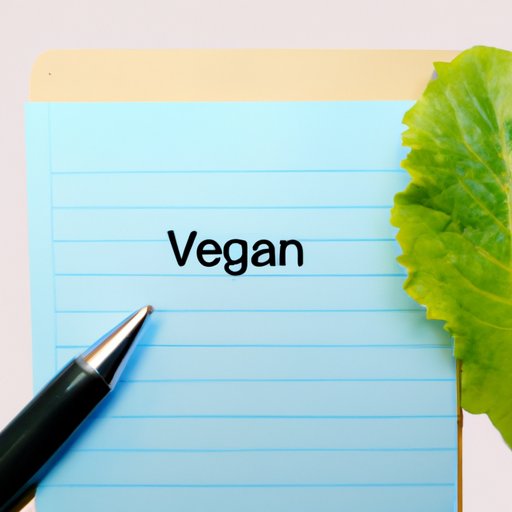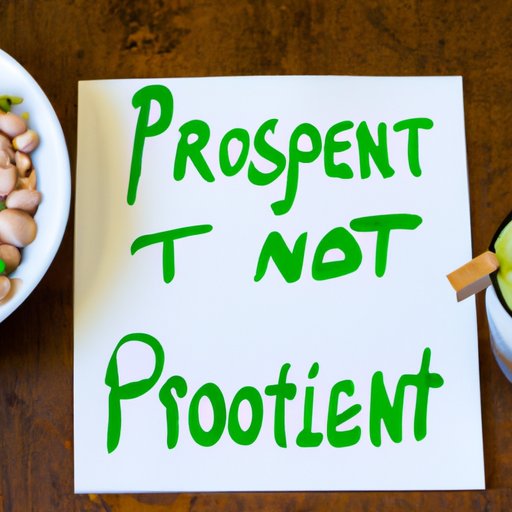
Introduction
If you’re curious about a plant-based diet or simply looking to improve your health, you may have heard about the benefits of going vegan. Adopting a vegan lifestyle means avoiding all animal products, including meat, dairy, eggs, and even honey. But is a vegan diet healthy? In this article, we’ll examine the scientific evidence supporting the benefits of a vegan diet, as well as potential risks and myths surrounding the topic. We’ll also provide tips on how to maintain a healthy and balanced plant-based diet.
Scientific Evidence Supporting the Benefits of a Vegan Diet for Overall Health
Recent studies have shown that adopting a vegan diet can lead to numerous health benefits. For instance, research suggests that vegans have a lower risk of obesity, hypertension, type 2 diabetes, and certain types of cancer. Additionally, some studies have shown that a vegan diet can improve athletic performance.
High-profile athletes, such as tennis player Venus Williams, NBA player Kyrie Irving, and NFL player David Carter, all credit their plant-based diets for improving their health and performance. A balanced vegan diet can provide all the necessary nutrients without the harmful effects of animal products.
The Potential Risks and Benefits of Switching to a Vegan Diet
While there are many benefits to a vegan diet, it’s important to consider the potential risks as well. For example, those who switch to a vegan diet may experience weight loss, but they may also risk nutrient deficiencies if they’re not careful. Common deficiencies include protein, calcium, omega-3 fatty acids, vitamin B12, and vitamin D.
However, it’s important to note that these deficiencies can be avoided with careful planning and a balanced vegan diet. Additionally, some misconceptions exist about the topic. For example, many people believe that vegans can’t get enough protein, when in fact, there are plenty of plant-based protein sources available, such as beans, lentils, nuts, and seeds.
Top 5 Essential Nutrients that Vegans Should Include in Their Diet
When following a vegan diet, it’s important to ensure proper nutrition. Here are the top 5 essential nutrients that vegans should include in their diet:
1. Protein: As mentioned earlier, it’s a common misconception that vegans can’t get enough protein. In reality, vegans can get all the protein they need from legumes, such as chickpeas, lentils, and black beans, as well as nuts and seeds.
2. Calcium: Calcium is important for strong bones, and can be obtained from fortified plant milks, tofu, and leafy green vegetables, such as kale and collard greens.
3. Omega-3 Fatty Acids: Omega-3s are important for brain health and can be found in foods such as flaxseed, chia seeds, hemp seeds, and walnuts.
4. Vitamin B12: Vitamin B12 is important for nerve function, and can be obtained through fortified foods such as plant milks, as well as supplements.
5. Vitamin D: Vitamin D is important for bone health and can be obtained through exposure to sunlight, as well as fortified plant milks and supplements.

Debunking Myths About Protein Deficiency in a Vegan Diet
One of the most common misconceptions about a vegan diet is that vegans are at risk for protein deficiency. However, as discussed earlier, plant-based protein sources are plentiful, and can provide all the necessary amino acids for a healthy diet.
Some delicious vegan protein sources include tempeh, tofu, lentils, chickpeas, beans, nuts, and seeds. A variety of plant-based meals, such as tofu stir-fry, lentil soup, or a hearty salad with nuts and seeds, can provide all the protein your body needs for energy and growth.
How a Vegan Diet Can Help Prevent Chronic Diseases Like Heart Disease and Diabetes
Various studies have linked a vegan diet with lower risk of chronic diseases such as heart disease, type 2 diabetes, and certain types of cancer. For example, a study found that a vegan diet improved cholesterol levels and decreased inflammation, both of which are known to contribute to heart disease.
Additionally, a vegan diet can help improve blood sugar control, lower blood pressure, and reduce the risk of certain types of cancer. The high fiber content in plant-based foods also has a direct effect on gut health, which can improve overall health and reduce the risk of chronic diseases.
Exploring the Environmental Impact of a Vegan Diet on Our Planet
The impact of animal agriculture on the environment has been well-documented. From greenhouse gas emissions to land degradation to water pollution, animal agriculture has a significant impact on our planet.
By adopting a vegan diet, you can make a positive impact on the environment. Not only does a plant-based diet reduce greenhouse gas emissions and land use, it also conserves water and preserves natural habitats. Veganism is a sustainable lifestyle choice that can make a difference for generations to come.
Tips for Transitioning to a Vegan Diet and Maintaining a Balanced, Healthy Lifestyle
If you’re interested in transitioning to a vegan diet, there are plenty of resources available to help you make a smooth switch. Here are some tips to help you get started:
- Gradually introduce new foods and recipes into your diet
- Find community resources, such as vegan cooking classes or support groups
- Ensure a balanced diet by incorporating a variety of foods
- Meal plan and batch cook to save time and money
Conclusion
In conclusion, a vegan diet can provide numerous benefits for both your health and the environment. While there may be some risks and myths surrounding the topic, with careful planning and a balanced approach, a vegan diet can be a healthy and sustainable lifestyle choice.





